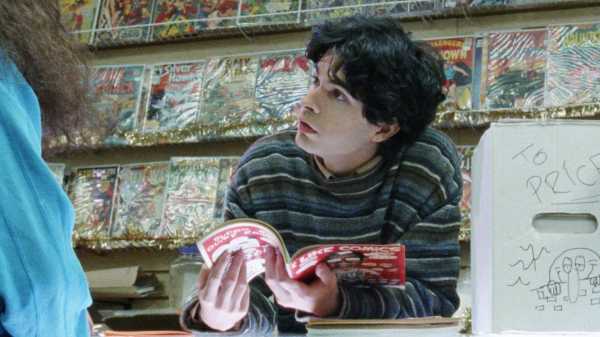
Owen Kline’s first feature, “Funny Pages,” is a film of ideas, or, rather of a single idea, with a conspicuous subject. Like many such films, its foreground of action and background of character are thinned out to make the illustration of its thesis all the clearer. The film is a serious comedy centered on a high-school student named Robert Bleichner (Daniel Zolghadri), a gifted artist and a comic-book connoisseur who, at seventeen, decides to drop out in order to pursue his goal of becoming a graphic novelist. Or, rather, he’s coaxed by a teacher, Connor Katano (Stephen Adly Guirgis), to put off college and begin his career at once. “Funny Pages” (which opens Friday in theatres and on video on demand) depicts the fragile bond of mentorship, the coming-of-age struggle for self-definition, and the conflicts between inspiration and technique, art and craft. It does so with an urgency that goes beyond its slender specifics, and it reaches out for an aesthetic, for a mode of artistic creation, that Kline himself doesn’t reach—but that he at least has the critical acumen to admire.
Mentorship stands at the fore of the film, in a rambunctious yet horrific scene of predation. Robert is in Mr. Katano’s office at school; Katano, a loud and hectoring middle-aged man, is praising to the skies Robert’s scatological, even racist drawings, exhorting him to “always subvert!” Katano deems Robert a Michael Jordan and a Kobe Bryant of comic-book art; he encourages Robert to submit his work for publication; he urges Robert to compile a portfolio; he advises Robert to display his ability in life drawing—and he gets naked (except for his socks and shoes) in front of Robert and prompts the student to draw him. From the start, it’s clear that the teacher whom Robert and his best friend—another budding cartoonist named Miles, played by Miles Emanuel—venerate is a manipulator, a seducer, a menace. But, after Katano’s sudden death, his influence over Robert rises to the status of a cult, and the young man decides to take the teacher’s suggestion.
Robert, who lives with his parents (Josh Pais and Maria Dizzia) and his grandfather (Ron Rifkin) in upper-middle-class suburban comfort in Princeton, New Jersey, drops out of high school, acquires a beat-up car from his boss at the local comic-book shop, moves to a grim illegal sub-sublet room in nearby Trenton, gets a job, and, through an odd coincidence, finds another mentor—a troubled middle-aged man named Wallace Schearer (Matthew Maher), a former commercial artist at an esteemed comic-book publisher, who now lives in appalling isolation and desperation, and whom Robert prevails upon for art lessons. Avoiding spoilers, it doesn’t go well: Wallace is knowledgeable and skilled, but he’s also narrow-minded, domineering, paranoid, and violent. When the relationship goes from bad to worse, Robert gleans a lesson about the long road to self-discovery and artistic achievement by way of incremental experience, personal relationships, and patient education—he learns that his dash into the unconventional is as conventional a step as there is, that his attraction to outsiders is as much of a prejudice as any they endure.
The tales of discipleship bookend “Funny Pages”: Katano dominates the start of the film and Wallace dominates the second half, and more or less everything that comes in-between exists to set up the points that Kline is making about the subject. Yet Kline assembles the illustrative plot as a gleefully intricate, Rube Goldberg-esque succession of interconnected accidents and weird coincidences, starting with the earnest whimsy of Robert’s ill-advised break-in at the recently deceased Katano’s office. Robert gets arrested, and his independent-minded resolution to his legal troubles—rejecting his father’s high-priced corporate-lawyer friend, he chooses a public defender named Cheryl Quartermaine (Marcia DeBonis) to represent him—sparks his decision to leave home and live independently. Then, in Trenton, he applies to Cheryl for work, she hires him, and it’s by way of his surprisingly good job with her (summarizing her interviews with clients) that he meets Wallace. The movie is a comedy, filled with antic absurdities, exaggerated personalities, actorly caricatures, uneasy situations, jolting incongruities, and off-kilter dialogue—yet it also relies on its recognizable genre for dramatic shortcuts, turning the story into a series of sketches and set pieces that are less focussed on character or experience than on making a point.
Cheryl is smart, devoted, and capable, and she teaches Robert valuable lessons about life and work, but she also can’t stop giggling about Robert as she calls him “cute” and “truly delicious.” The landlord of Robert’s sub-sublet in Trenton is a late-middle-aged guy named Barry (Michael Townsend Wright) who has a messy comb-over and a passive-aggressive manner; he keeps his cluttered warren, which features a rank green fish tank in which the fish have died, heated to tropical excesses, and he puts Robert in a room with an unexpected roommate (Cleveland Thomas, Jr.). Barry is something of a reclusive connoisseur of defunct pop culture and comic-book lore, and he copiously, if affectlessly, discourses on these subjects, but there’s an odd air of squeamish sexuality which seems to seep through the hermetic dwelling’s closed doors.
Wallace, who has legal trouble, pushes Robert into a reckless revenge plot at a pharmacy where Wallace’s trouble started. (There, Robert meets a desperate disabled woman—played by Louise Lasser—who rantingly harasses him for a Percocet.) Kline conspicuously avoids romanticizing the poverty and the desperation of the Trenton misfits and oddballs who people the film, but, rather, he falls into the opposite extreme: he turns them into flailing grotesques and looks at them with an outsider’s pity; he doesn’t make room for anyone in a hard situation who has something of a clear perspective on their difficulties. There’s an unfortunate trope—or, rather, cliché—of the well-meaning cinema of sympathy that casts poor people and working people into grim silence and denies them discourse regarding their lives, their neighborhoods, and the world at large. “Funny Pages” offers the negative image of that trope, giving Robert’s newfound acquaintances often ample discourse that comes off as borderline deranged, as an emblem of disturbance and a marker of potential menace.
As for Robert’s den of peers, the all-male hothouse of the comic-book shop where he works before going out on his own, it’s a conclave of fanatical connoisseurs whose salty opinions and definitive judgments are dispensed from the high horse of obsession and obscurity, pride and resentment—and this setting, too, is a clichéd parody that pins its sophomoric and eternally adolescent acolytes to the corkboard with nothing like a personality or a thought. Robert himself is as harshly and narrowly judgmental as his fellow-fans, erecting a cult of craft and an obsession with technique that resembles a teen-age cinephile’s fascination with such precisionists as Kubrick or Spielberg, along with a crude and callow eroticism. Yet Robert remains a cipher, defined solely reactively as he pushes back against his parents. The high point of the film comes early, in a quiet tirade at a diner, in which Robert gets angry at his father for supplying him with a high-powered lawyer friend to represent him. The brief sequence hints at a depth of character, a framework of underlying principle and substance, that the rest of the movie lacks.
Robert’s friend Miles, less of a critic and more of a slacker (with the extravagantly long hair to show it), has an altogether more relaxed and open-minded view of comic-book art—and he displays skepticism regarding Robert’s remora-like drive to attach himself to a mentor. Miles is something akin to the movie’s conscience: a diffusely drawn yet sharply perceptive character, the shadowy negative image of Robert’s worshipful submission to inflated adult figures of artistic authority and rigorous discipline—ones who, for all that he latches onto them, latch back all the more needily and dubiously. In effect, “Funny Pages,” despite its winks toward the comic-book coming-of-age classic “Ghost World” and the nerd-dialectical “High Fidelity,” is above all an anti-“Whiplash,” a repudiation of the value of the young aspirant’s desperate dependence on a technically skilled but emotionally stunted veteran’s lessons and approval.
The film’s unequivocal advocacy for unfettered artistic expression, for the freewheeling efforts and enthusiasms of youth, unfortunately doesn’t extend to the onscreen artistry of Kline himself. The movie is crisp and starched in its performances, pin-neat in its dramaturgy, chipper and functional in its writing, film-school patterned in its editing, and—most surprisingly—plain and uninflected in its cinematography. There are two credited directors of photography, Sean Price Williams and Hunter Zimny. Williams is one of the most original cinematographers of the century, as seen in such essential films as Ronald Bronstein’s “Frownland,” Josh and Benny Safdie’s “Heaven Knows What” and “Good Time,” and all six of Alex Ross Perry’s features; Zimny is a relative newcomer. (Bronstein and the Safdies are among the producers of “Funny Pages.”) In any case, the images have little distinction, certainly none of the high-energy virtuosity that marks Williams’s vital work. Whatever sense of obsession drives Robert’s art and whatever emotional freedom inspires Miles’s, neither is found in the cinematic aesthetic of “Funny Pages”; the movie is merely a conventional vessel for Kline’s ardent ideas, which pass through the cinema without leaving a trace.♦
Sourse: newyorker.com






